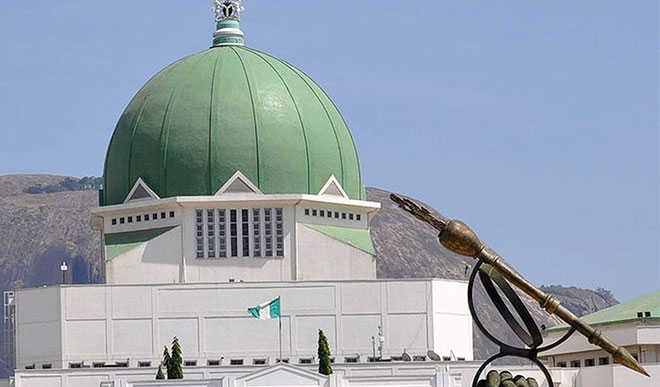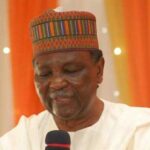
In the effervescent Nigerian political space, the past week or so witnessed the dominance of two scenarios, which placed the National Assembly – the Senate in particular, squarely in the public gaze. This is even as these ‘power shows’ (courtesy of late Afro beat music maestro – Fela Anikulapo Kuti ), were driven by the often blinding passion of individuals to exercise impunity as of right. So engaging were these drama scenes that they nearly diverted media and public attention from the return of President Muhamadu Buhari to work, after his 50-day absence from office.
In the first place was the matter involving the Comptroller General of the Nigeria Customs Service (NCS) Colonel Hameed Ali (rtd), in which he allowed a routine interface between his agency and the Senate to degenerate into a battle of wits, even as he had no chance of returning unscathed.
The second case was slightly different as it featured the exercise of impunity by President Buhari himself, with the re-nomination of Mr Ibrahim Magu for confirmation by the Senate as the substantive Chairman of the Economic and Financial Crimes Commission (EFCC). This was after the same Senate had earlier declined to confirm the gentleman, on the basis of a report from the Department of State Services (DSS). Both the DSS and EFCC are under the Presidency.
In the first case, the Customs Service had claimed that many the estimated 10 million vehicles (mostly imported) that ply Nigerian roads, had failed to pay the appropriate Custom duties at the various points of entry into the country. The agency then envisaged a stop-and-check exercise on all vehicles on all roads across the country, in order to identify and isolate for sanctions, defaulting ones in the payment of custom duties among them, and thereby enforce compliance.
Expectedly there arose widespread public outcry over the unprecedented initiative, based on several grounds. Firstly was the retroactive nature of the action as it aimed at punishing defaulters believed to be in their millions nationwide, for an offence that was committed in the past and through the unmistakeable culpability of Customs officers. Secondly was the envisaged chaos it would have unleashed on the entire country as the nation’s road network would have been literally clogged up at multiple Customs checkpoints, as the agency proceeds to contravene duty-defaulting vehicles. Even at that, the agency restricted payment points to few centres instead of the trending payment platforms that operate through the banks, which would have given the scheme some measure of workability.
The fall outs from the exercise even if it succeeds, are easily imaginable with the Customs officials facing resistance from the full complement of the good, bad and ugly elements among Nigerians road users. Needless to point out that the scheme would have degenerated to a tacit deployment of several Customs officers to unnecessary conflicts with members of the public and even early graves, as they would have seen ‘pepper’ at these check points. Trust Nigerians.
However, beyond the loss of collectible and missing national revenue from the default by the offending vehicles – which seems to be the sole motivation of the Customs, lie more significant security issues. For instance it is incontestable that most of these vehicles are believed to be outrightly unregistered or improperly captured in the country’s official vehicular data base, and therefore remain unknown to law, thanks to the tardy operations of the nation’s inchoate vehicular registration protocol. They are therefore prime security risks factors for the country for being easily deployable to purposes that are also often unacceptable to law. Hence the initiative by the Customs should have enjoyed a buy-in by other security agencies; in which case the modalities for execution would have been different.
The intervention of the National Assembly in response to the outcry by Nigerians, was justified, just as it was also intended to save the face of the Customs leadership (with CG Ali as chief beneficiary), before the Nigerian public over the blunder the former had contrived. Hence, all that the CG needed to do was fall in tow with the legislature, and let them drive the entire exercise, given their status as the representatives of the people, and are therefore better disposed to absorb any negative fall outs from the exercise, in case it proceeds.
Rather he chose to grand stand with impunity, through open defiance of the Senate’s invitation to appear before it. Of course, at the end the day the CG got what he wanted as the Red Chamber humiliated him by turning him back when he eventually honoured the Senate’s invitation last Thursday to appear before it. He left in humiliation with an order to appear before it next week in the full uniform of the CG. Even as he is contemplating to seek legal advice on the issue, it will serve his interest and that of his principal the President, for him to consult a tailor and procure the uniform as well as appear before the Senate as ordered. That is if he is still interested in the juicy office of CG of the Nigeria Customs Service. In the alternative he can work and pray for his re-designation as Sole Administrator of the Customs, which is safer for him in the present circumstances. That will be in addition to the advice from Distinguished Senator Magnus Abbe that Hameed Ali also consults a Public Relations Consultant over his tiff with the Senate.
The unfolding drama between Ali and the Senate also offers more implications than may be casually appreciated. Beyond any other is the insight it provides into the leadership style of the Customs CG Hameed Ali in the affairs of the agency. The unanswered question is whether the agency is administered according to extant rules and regulations, or the nuances and idiosyncrasies as well as whims and caprices of an individual who happens to find himself by accident at the helm of its affairs. This issue needs to be resolved in the wider interest of Nigerians as well as the Customs Service in particular. And the responsibility for that exercise rests squarely with the Senate, especially now that the Chamber has unquestionable evidence that lawlessness may be the order of the day, in that establishment. It is significant that the House of Representatives is also conducting an independent probe of the same Nigeria Customs Service, which points to the fact that all is not well with the agency.
As for the issue of Mr Ibrahim Magu, this is a season for him to celebrate rather than mourn. Even if he leaves the EFCC today, he should be able to thump his chest as an achiever in office. His travails over non-confirmation as substantive Chairman of the EFCC only portray the often unpredictable nature of the processes of the public service, and the sacrifices that incumbents of sensitive positions occasionally make. As evidence shows, his serial denial of confirmation by the Senate is not the fault of the Red Chamber, nor the President who nominated him severally too in expression of confidence in Magu ability to perform. Rather the fault lies in his own constituency – the security architecture of the country.
Hence, just as he noted at his last visit to the Senate, that the anti corruption war will continue with or without him as the substantive Chairman of the EFCC, a closer look by his agency and enterprise in the direction of his traducers may yield yet undiscovered dividends of the anti corruption war. After all, if the system can allow for the serial embarrassment of the President over Magu’s avoidable re-nomination drama, even in the face of the DSS report, for whatever it is worth, there could be more than meets the uninitiated eye.
Nigerians are therefore looking forward to a sweep of the anti-corruption searchlight across the wood-worms in the wood-work of the Presidency, who misled President Muhammadu Buhari into a regrettable playout of Presidential impunity, by re-nominating Magu to the Senate, even in the face of patent, unresolved in-house disharmony in the Presidency, as exemplified by the inter-agency misgivings between the DSS and EFCC.

 Join Daily Trust WhatsApp Community For Quick Access To News and Happenings Around You.
Join Daily Trust WhatsApp Community For Quick Access To News and Happenings Around You.


